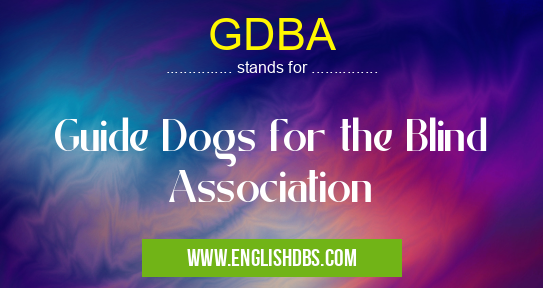What does GDBA mean in VETERINARY
The Guide Dogs for the Blind Association, or GDBA, is an incredible organization dedicated to providing the empowering gift of mobility to those living with sight loss. Through their innovative and specialized training methods, GDBA gives blind and partially sighted people the chance to gain independence, confidence, and a more fulfilled life.

GDBA meaning in Veterinary in Medical
GDBA mostly used in an acronym Veterinary in Category Medical that means Guide Dogs for the Blind Association
Shorthand: GDBA,
Full Form: Guide Dogs for the Blind Association
For more information of "Guide Dogs for the Blind Association", see the section below.
» Medical » Veterinary
Mission
GDBA's mission is simple yet profound — to provide ‘freedom to lead a full life' for those in need. To do this, they offer three key programs that are designed to promote physical and mental wellbeing through companionship and guidance. These services include guide dog partnerships, which provides specially trained assistance dogs for visually impaired individuals; My Guide — which pairs up skilled volunteers with independent navigation mentors; and Social Dog — a unique program that uses pet dogs as social facilitators in the community.
Impact
Unsurprisingly, the work delivered by GDBA has had an immense impact on those who benefit from its services. Not only do their assistance dogs offer countless practical benefits such as helping people negotiate busy streets or find public transport links; but they also give incredible emotional support. This helps build confidence in those who have difficulty seeing their way around unfamiliar environments or tasks — transforming their lives for the better. By providing these essential aids — both physical and psychological - GDBA works tirelessly every day to renew hope and optimism within the blind/partially sighted population.
Essential Questions and Answers on Guide Dogs for the Blind Association in "MEDICAL»VET"
What Does a Guide Dog Do?
Guide dogs are trained to provide assistance to people who are blind or visually impaired, allowing them to travel safely and independently. Guide dogs use their high levels of obedience and intelligence to lead the handler while avoiding obstacles, stopping at curbs and stairs, navigating through crowds or finding specific destinations.
How Long Does it Take To Train a Guide Dog?
Training a guide dog typically takes 12-14 months and requires considerable skill on behalf of the trainer. This intensive training period starts with basic commands such as sit, stay and come which help establish obedience. Further training builds upon these commands by introducing more intricate commands used to guide individuals in increasingly complex environments.
Are Guide Dogs Allowed on Public Transport?
Yes. Guide dogs are allowed onto public transport such as buses, trains and airlines. If you plan to travel with your guide dog then you must inform the operator in advance so that appropriate arrangements can be made for you both.
Do I Need A Special License To Own A Guide Dog?
No, you do not need a special license to own a guide dog but if you are applying for one from an approved guide dog organization like The Guide Dogs for the Blind Association (GDBA), it is important that you meet the criteria outlined by them first before going ahead with adoption.
How Much Does A Guide Dog Cost?
The GDBA provides free guide dogs to registered blind people at no cost but they do ask recipients to make donations towards the upkeep of their dog once they have been given their new companion. The average cost of an assigned guide dog is estimated at around £2,000 excluding other costs such as veterinary bills, kennelling fees or food expenses.
Who Can Apply For A Guide Dog From GDBA?
The GDBA provides guides dogs solely for registered blind people who have met certain criteria defined by them including age limits (generally over 16 years old) and prior experience of living with a disability if applicable. If you think you fit into this category then please contact them directly for more information on eligibility requirements before submitting an application form.
How Do I Obtain A Replacement Should My Current Guide Dog Pass Away?
If your current guide dog unfortunately passes away while under service then please contact GDBA immediately who will support your request for a replacement accordingly usually subject to availability or following assessments of eligibility needs upto 12 months later if better suited matches cannot be found at the time requested.
Final Words:
It goes without saying that GDBA performs a valuable service across the country - creating empowered communities where independence is celebrated rather than feared. Their inspiring successes can be attributed both to their passionate staff members who work hard every day to improve quality of life; and the generous donations made by individuals across society who wish to help make dreams come true for people living with sight loss. We thank them all wholeheartedly for bringing light into so many dark places!
